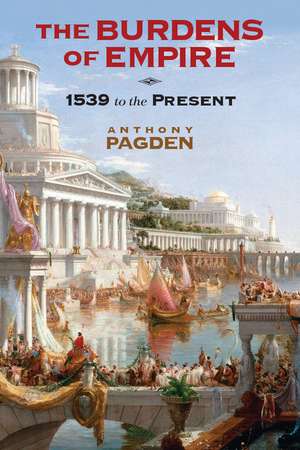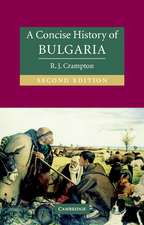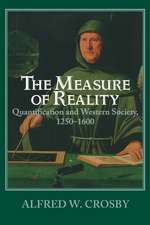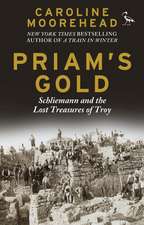The Burdens of Empire: 1539 to the Present
Autor Anthony Pagdenen Limba Engleză Paperback – 18 mar 2015
| Toate formatele și edițiile | Preț | Express |
|---|---|---|
| Paperback (1) | 186.71 lei 3-5 săpt. | |
| Cambridge University Press – 18 mar 2015 | 186.71 lei 3-5 săpt. | |
| Hardback (1) | 609.63 lei 6-8 săpt. | |
| Cambridge University Press – 15 mar 2015 | 609.63 lei 6-8 săpt. |
Preț: 186.71 lei
Nou
Puncte Express: 280
Preț estimativ în valută:
35.73€ • 37.17$ • 29.50£
35.73€ • 37.17$ • 29.50£
Carte disponibilă
Livrare economică 24 martie-07 aprilie
Preluare comenzi: 021 569.72.76
Specificații
ISBN-13: 9780521188289
ISBN-10: 0521188288
Pagini: 302
Dimensiuni: 150 x 230 x 20 mm
Greutate: 0.41 kg
Editura: Cambridge University Press
Colecția Cambridge University Press
Locul publicării:New York, United States
ISBN-10: 0521188288
Pagini: 302
Dimensiuni: 150 x 230 x 20 mm
Greutate: 0.41 kg
Editura: Cambridge University Press
Colecția Cambridge University Press
Locul publicării:New York, United States
Cuprins
1. Introduction; 2. Defending empire: the 'school of Salamanca' and the 'affair of the Indies'; 3. 'Making barbarians into gentle peoples': Alberico Gentili on the legitimacy of empire; 4. The peopling of the New World: ethnos, race and empire in the early modern world; 5. Conquest, settlement, purchase and concession: justifying the English occupation of the Americas; 6. Occupying the ocean: Hugo Grotius and Serafim de Freitas on the rights of discovery and occupation; 7. Cambiar su ser: reform to revolution in the political imaginary of the Ibero-American world; 8. From the 'right of nations' to the 'cosmopolitan right': Immanuel Kant's law of continuity and the limits of empire; 9. 'Savage impulse-civilised calculation': conquest, commerce and the Enlightenment critique of empire; 10. Human rights, natural rights and Europe's imperial legacy.
Recenzii
'No scholar has done more than Anthony Pagden to direct attention to the forms and fates of empire across human history. The Burdens of Empire should command a wide audience among intellectual historians, political theorists, early modernists, and imperial historians at all levels.' David Armitage, Lloyd C. Blankfein Professor of History and Chair of History, Harvard University, Massachusetts, and author of Foundations of Modern International Thought
'These brilliant meditations on the durability of empire as a political form, and on the imperial origins of universal ideals from Stoic cosmopolitanism to international law and contemporary human rights, repeatedly demonstrate the novel theoretical insight that can come from immersive historical study. The chapter on imperial Spain ('Cambiar su ser') is a tour de force that exhibits Pagden's unrivalled authority on the political thought of the Spanish empire. With trenchant analysis, a wealth of information, and great breadth of reference, The Burdens of Empire breathes fresh life into themes from European aspirations to civilize 'barbarians', to the dangers of unlimited expansion, to the rise of political economy in the eighteenth century.' Jennifer Pitts, University of Chicago
'Anthony Pagden has long been among the most penetrating and learned historians of early modern empire and political thought. The Burdens of Empire charts, with extraordinary lucidity, the implication of law in the European project of empire. This history includes complex efforts of both constraint on conquest and its legitimation. Above all, Pagden reveals the endowment left to the project of international law by its birth, alongside modern nationalism, in the crucible of the nineteenth century.' Cliff Ando, David B. and Clara E. Stern Professor, University of Chicago
'In this series of essays, Pagden examines enduring themes in the history of empire, underscoring ways in which intellectual, legal, and moral debates generated by imperial rule fundamentally shaped concepts of such universal ideals as human rights and international law … In the book's nine chapters, Pagden treats such topics as the legality of European conquests in the Americas, conceptions of human difference, arguments over control of the seas, and changing valuations of conquest and commerce in imperial ideologies, among others. He successfully carries his themes across the different chapters, which make a forceful case for the significance of imperial history in understanding the modern world, particularly ancient and early modern intellectual history. Summing up: highly recommended.' M. A. Soderstrom, Choice
'In this erudite and sophisticated volume, one of the world's leading historians of the early modern European imperial imagination brings together some of the best of his life's work on the intellectual history of empire.' Ricardo Padrón, E-International Relations (www.e-ir.info)
'Scholars of empire, international relations, and human rights will learn a lot from the author's breathtaking knowledge of European legal, theoretical, and moral claims for and against empire in the early modern period.' Pernille Røge, Journal of World History
'These brilliant meditations on the durability of empire as a political form, and on the imperial origins of universal ideals from Stoic cosmopolitanism to international law and contemporary human rights, repeatedly demonstrate the novel theoretical insight that can come from immersive historical study. The chapter on imperial Spain ('Cambiar su ser') is a tour de force that exhibits Pagden's unrivalled authority on the political thought of the Spanish empire. With trenchant analysis, a wealth of information, and great breadth of reference, The Burdens of Empire breathes fresh life into themes from European aspirations to civilize 'barbarians', to the dangers of unlimited expansion, to the rise of political economy in the eighteenth century.' Jennifer Pitts, University of Chicago
'Anthony Pagden has long been among the most penetrating and learned historians of early modern empire and political thought. The Burdens of Empire charts, with extraordinary lucidity, the implication of law in the European project of empire. This history includes complex efforts of both constraint on conquest and its legitimation. Above all, Pagden reveals the endowment left to the project of international law by its birth, alongside modern nationalism, in the crucible of the nineteenth century.' Cliff Ando, David B. and Clara E. Stern Professor, University of Chicago
'In this series of essays, Pagden examines enduring themes in the history of empire, underscoring ways in which intellectual, legal, and moral debates generated by imperial rule fundamentally shaped concepts of such universal ideals as human rights and international law … In the book's nine chapters, Pagden treats such topics as the legality of European conquests in the Americas, conceptions of human difference, arguments over control of the seas, and changing valuations of conquest and commerce in imperial ideologies, among others. He successfully carries his themes across the different chapters, which make a forceful case for the significance of imperial history in understanding the modern world, particularly ancient and early modern intellectual history. Summing up: highly recommended.' M. A. Soderstrom, Choice
'In this erudite and sophisticated volume, one of the world's leading historians of the early modern European imperial imagination brings together some of the best of his life's work on the intellectual history of empire.' Ricardo Padrón, E-International Relations (www.e-ir.info)
'Scholars of empire, international relations, and human rights will learn a lot from the author's breathtaking knowledge of European legal, theoretical, and moral claims for and against empire in the early modern period.' Pernille Røge, Journal of World History
Notă biografică
Descriere
This book examines how modern Western history has been shaped by the rise and fall of the great European empires.











